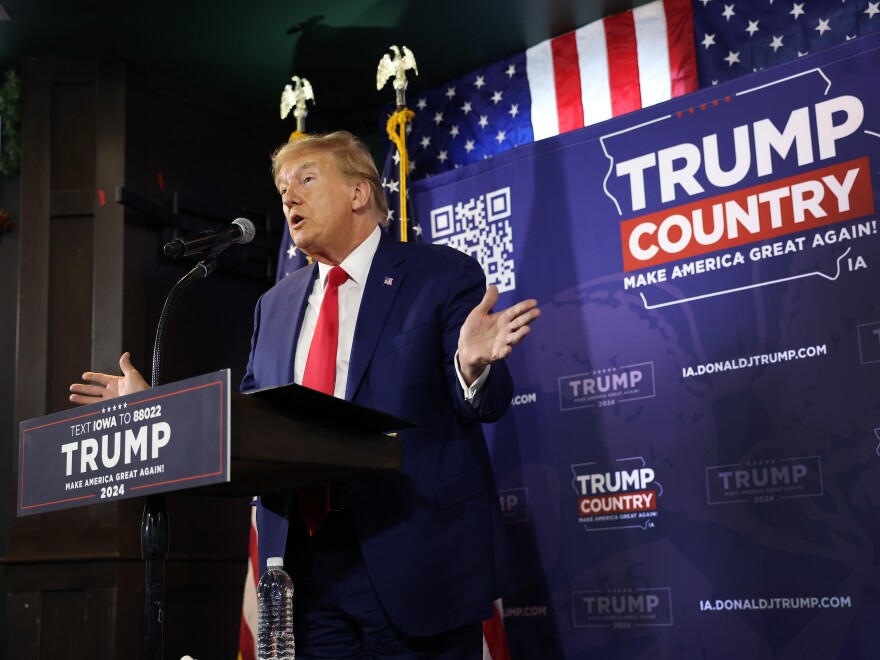Former President Donald Trump and his allies are preparing for an aggressive expansion of his powers should he take back the White House.
That includes more power to crack down on immigration and overhaul the Justice Department to punish opponents.
Trump mocked fears about his authoritarianism tendencies at a Fox News town hall on Tuesday, stating he'd be a dictator only on "Day 1" so that he could close the border and start drilling.
"After that, I'm not a dictator, OK?" Trump told host Sean Hannity to applause from the Iowa crowd.
The fiery language is not new, but he and a group of Trump insiders are working behind the scenes on plans to amass his power so that he can carry out an unprecedented restructuring of the U.S. government.
Breaking through bureaucracy
During their last go in the White House, say former Trump officials like Russ Vought, who served as Trump's budget director at the White House, career staff members often blocked or slow-walked even the smallest efforts to make policy changes.
"I can't tell you how many times I would get the question, 'Well, that's not allowed,'" remembered Vought, who is now president of the think tank Center for Renewing America.
He then went on to describe a typical exchange between himself and a career staffer:
Vought is now helping to lead a team drafting plans that would curtail the independence of some federal agencies and end government protections for tens of thousands of federal employees — whom Trump calls the deep state — so that those employees could be replaced with partisan loyalists.
A key part of this effort revolves around reinstituting an executive order known as Schedule F, which would reclassify a large chunk of those federal staff members as at-will employees.
And that is raising concerns about authoritarianism.
It's not that the federal service isn't in need of reforms, says Kathryn Dunn Tenpas, a senior fellow at the University of Virginia's Miller Center.
But she says Trump wants to create a class of federal workers who will do whatever the president wants — and if they don't, they can be easily fired.
"It's just a dangerous sign," she says. "It really suggests that a president wants to aggrandize more authority and more power. And that should make everybody nervous."
Expanding executive power
Much of the work is happening behind the scenes, but it involves some high-profile Trump leaders working together and on parallel routes.
Paul Dans, a former Trump administration official, is director of the 2025 Presidential Transition Project, a conservative think tank organizing dozens of partners who have joined the effort to build this government in waiting.
Brooke Rollins, Trump's former domestic policy chief, leads the America First Policy Institute, which is working on a similar effort, called Pathway to 2025.
They share the belief that too many federal workers at executive branch agencies, whom they call the administrative state or deep state, have become a "fourth branch of government" and have turned into a roadblock for any conservative change.
"We are a clarion call for conservatives," Dans explained. "We want to demystify Washington. We want to break it open and let the rest of America come in."
The federal workforce is made up of tens of thousands of nonpolitical career civil servants who remain on their jobs regardless of who is the president.
Trump argues that the ranks are filled with too many liberals.
There are not enough conservatives in government, which leads to groupthink at some agencies, says Kevin Kosar, a senior fellow at the conservative American Enterprise Institute.
He likes the idea of training more conservatives, but he says the current plans are not durable and can be reversed by a subsequent Democratic administration.
What's worse, he says, is this would then only worsen the policy whiplash that is already plaguing Washington.
"I mean, Obama issues an executive order on immigration. Trump issues one that changes it in the other direction. Biden issues one that goes in the other direction," Kosar says. "That's policy instability."
Since learning of the efforts, the Biden White House has proposed a new rule that would strengthen protections for federal workers.
But Trump's people say that this won't stop their momentum.
Dans says now is the time for conservative warriors to step up.
"This is your calling," he says. "This is your moment in life. We're talking to you. You can't just sit there on the sidelines anymore and kvetch about this."
The Trump campaign did not respond to questions about the efforts. But Project 2025 is not just for Trump. It's available for any conservative candidates.
Still, Dans says Trump is the best embodiment of their movement.
"Well, we're candidate agnostic. We're at this for the service of any standard-bearer," he says.
"But we're not reality agnostic," he added.
Copyright 2024 NPR. To see more, visit https://www.npr.org.



